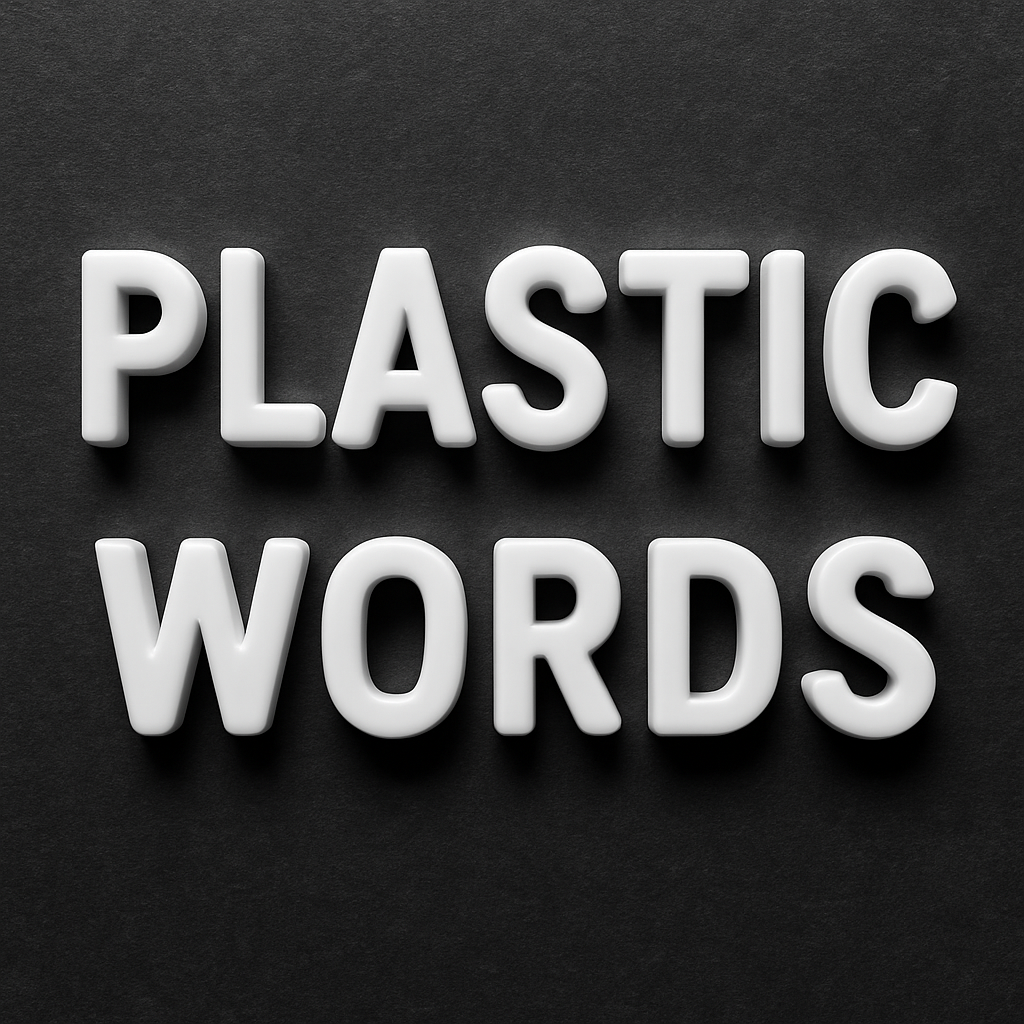How Hollow Language Is Killing American Politics
What does “equity” actually mean?
How about “sustainability,” “innovation” or “community engagement”?
You’ve heard these words in speeches, campaign ads, nonprofit mission statements and press conferences. They float through the air like the smell of freshly printed mailers: familiar, inoffensive and vaguely comforting.
But press a little harder. Ask what they really mean.
And that’s where the illusion begins to crack.
Because in modern politics, we’re not using language to communicate ideas. We’re using it to simulate meaning. We’ve built an entire political vocabulary out of what linguist Uwe Poerksen called “plastic words.”
Like plastic, these words are mass-produced, resistant to decay, and clogging the arteries of our civic discourse.
What Are Plastic Words?
Uwe Poerksen defines them as terms borrowed from science, management and academia that sound profound but are deliberately vague and abstract.
They are:
• Emotionally loaded
• Supposedly universal
• Deceptively hollow
They promise everything and explain nothing.
“Sustainability” sounds like stewardship but means anything from ESG mandates to a new marketing campaign for electric lawn mowers.
“Equity” sounds like fairness but in practice often means shifting outcomes without addressing inputs or effort.
These are not just words. They are thought substitutes. Verbal sedatives. Buzzword opioids.
They make us feel like we’re having a conversation. We’re not actually thinking.
Behavioral Insight: Words Shape Trust
Behavioral science tells us we are meaning-seeking creatures. When language becomes incoherent or manipulative, trust collapses.
Rory Sutherland puts it brilliantly:
“When words lose meaning, people lose trust. When people lose trust, systems collapse.”
Think of it like this:
• In physics, systems collapse under pressure.
• In politics, they collapse under vagueness.
Plastic words are the enemy of clarity, accountability and emotional resonance. When people hear too many of them, they either tune out or rise up.
Usually both.
The GOP Isn’t Innocent
Now, let’s not pretend this is just a problem on the left. The right has its own graveyard of consultant-approved, focus-grouped nonsense.
You’ve heard it:
“We’re delivering bold, results-driven innovation for working families.”
“We’re committed to a strategic vision of economic revitalization and shared prosperity.”
That’s not leadership. That’s a PowerPoint deck with a flag on it.
We didn’t win the Cold War with “shared prosperity.”
We won it with clarity, courage and moral confidence.
What Real Language Sounds Like
Here’s the alternative:
• Don’t say “economic revitalization.”
Say: “We’re bringing your Main Street back to life.”
• Don’t say “building a culture of excellence.”
Say: “We reward effort. Not excuses.”
• Don’t say “strategic infrastructure investments.”
Say: “You deserve roads that don’t destroy your suspension.”
Great leaders don’t just inform. They connect.
They don’t just declare. They inspire.
Ronald Reagan didn’t say, “Let’s reassess your household financial metrics.”
He asked: “Are you better off than you were four years ago?”
That’s not just effective messaging. It’s civilizational literacy.
The Real Danger
When words become untethered from meaning, power becomes untethered from responsibility.
No one can be held accountable for equity, sustainability or innovation.
Because no one knows what those things actually look like.
Which means no one can fail. And no one can lead.
What We Must Do
- Demand clarity from candidates, officials and organizations. Ask: “What do you mean by that?”
- Stop repeating slogans. Start telling stories.
- Reward real language. Punish spin.
Because truth isn’t just a virtue. In politics, it’s a weapon. It’s also a foundation.
Final Thought
Plastic words build plastic minds. Plastic minds can’t build civilizations.
If we’re going to rebuild America, we start by reclaiming our words.
Not with jargon. Not with slogans.
But with the courage to speak plainly, the clarity to think deeply and the conviction to tell the truth.
Even when it’s unpopular.
Especially when it’s unpopular.

